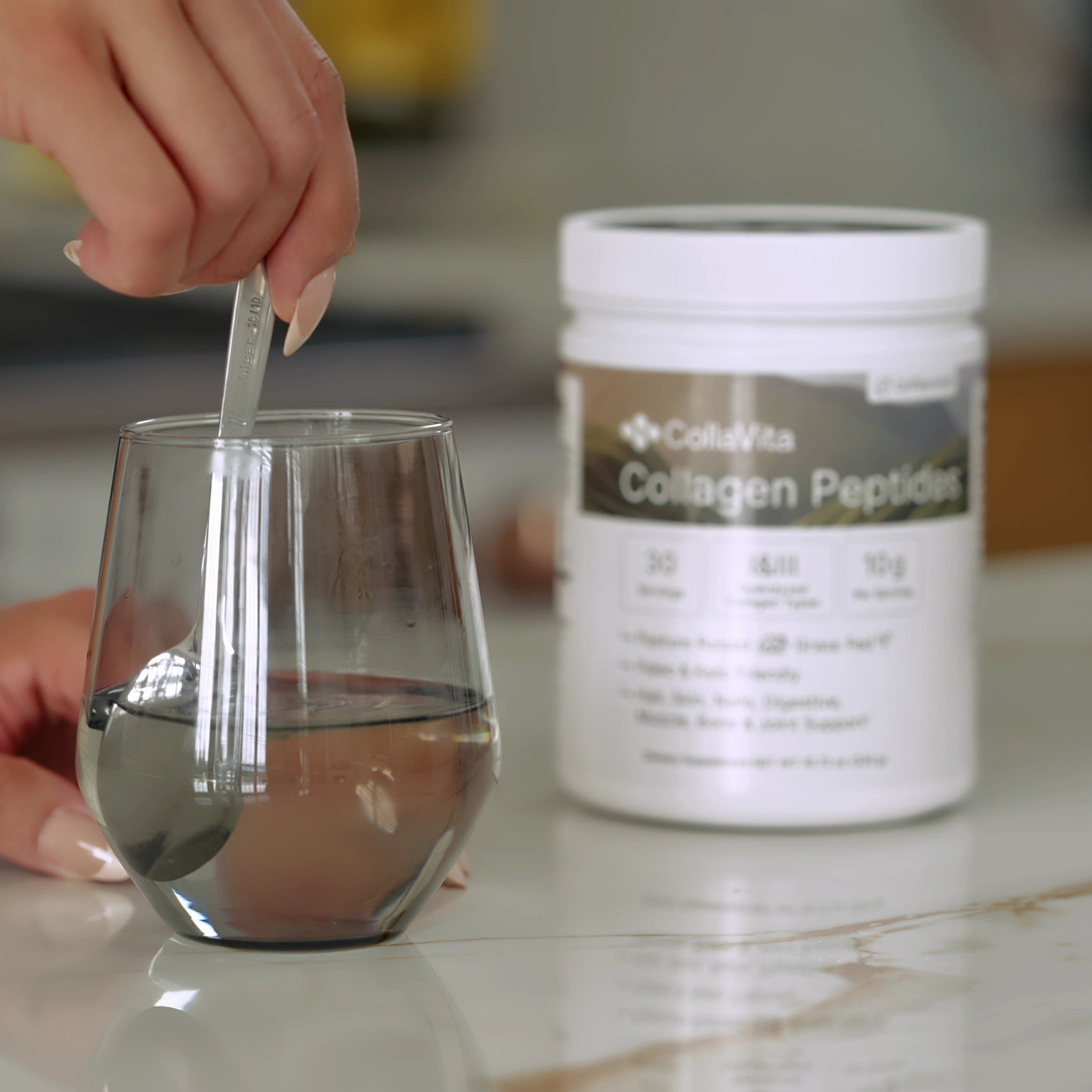What is the Best Time to Take Collagen?
The best time to take collagen depends on personal preferences and lifestyle. Consuming collagen at any time of day is risk-free, but it works best when taken at the right moments.
Based on experts' recommendations, here are the best times to take collagen. Use these windows of opportunity to schedule your collagen consumption.
Potential Benefits of Morning Intake:
Starting your day with collagen on an empty stomach has two main advantages. Firstly, an empty stomach in the morning allows your digestive tract to be free of waste, which facilitates your body's absorption of the collagen supplement you consume. Second, if you want to boost your energy and metabolic rate, waking up with collagen intake will help your day go more smoothly and give you more energy.
Potential Benefits of Nighttime Intake
Because it contains the amino acid glycine, which helps soothe the nervous system, collagen powder supplements can improve your sleep quality. Additionally, taking collagen supplements before bed is a wise decision if you want your skin to restore itself to its fullest potential while you sleep. The benefits of taking collagen at night go further than that; it improves gut health and digestion by strengthening the digestive tract.
The Importance of Consistency
The collagen supplement dosing schedule should mirror the frequency of collagen loss. Collagen loss reaches alarming proportions after the age of 40, particularly in women. Therefore, women should take collagen supplements on a regular basis after the age of forty, especially if they have menopause.
The secret to sticking to a supplement routine is making collagen supplementation a part of your everyday routine. Even anything as basic as consistently sipping on a glass of water, coffee, or fruit juice at the same time each day could be considered routine.
For Specific Goals
If you're using collagen supplements for a specific reason, the supplement's content should be tailored to that reason. To prevent receding hair, consider consuming a biotin-containing collagen supplement. On the other hand, problems involving the skin or internal organs can be addressed with Type-1 and Type-3 collagen.
Pre-Workout (15-45 minutes)
Taking collagen supplements before exercise can help you satisfy your energy needs while exercising. The body takes a long time to break down collagen into amino acids, so taking supplements containing it 45 minutes before working out will give you the energy boost you need.
Post-Workout
Taking collagen supplements after exercise also has several benefits. When you exercise, all of your body's cells benefit and function together. The body can now make the most efficient use of all the nutrients as every cell is now active. Having food right after a workout raises the probability of gaining excess weight. However, because collagen works best when taken in small doses, the recommendation is to take it after exercise for maximum benefit.
Before Meals
Another option is to take the collagen supplement at various intervals throughout the day, divided into smaller doses, and taken before meals. Daily collagen supplement dosages of 10–20 or even more grams may be necessary. If you aren't experiencing any side effects, taking it all at once first thing in the morning or before bed is perfectly fine.
Nevertheless, for many individuals, taking collagen supplements could lead to gastrointestinal issues, allergies, or even nausea. So, taking collagen before meals is a wonderful idea; the amount you take at once or in smaller doses won't make much of a difference.
After Meals
People with gastrointestinal issues should take collagen supplements after meals. Despite hydrolyzation technologies reducing collagen to lower molecular weights, its molecular weight remains exceptionally large. In particular, those who suffer from gastrointestinal issues should only take it under a doctor's care. For people who are experiencing gastrointestinal issues, taking collagen supplements after meals is now a viable solution.
Best Time to Take Collagen for Skin
Collagen can really improve our skin. Think of it like blowing air into a balloon. Still, for collagen to work fast, you have to take it when your skin is most vulnerable to wrinkling. Applying a collagen supplement before going outside in potentially irritating circumstances, such as direct sunlight or very cold temperatures, is a smart move for your skin.
At these intervals, you should take a collagen supplement that both hydrates your skin and stops its natural collagen production, thereby preventing collagen loss.
Best Time to Take Collagen for Joints
Typically, type-2 collagen from poultry is used for joints. Because type-2 collagen has a relatively high molecular weight and requires more time to break down, it's important to take your joint collagen supplement when your digestion is at its peak. Having said that, every person's digestive system and overall body composition are different. While some people find excellent success in the morning, the best time to take your collagen for joint pills is just before bed.
Best Time to Take Collagen for Hair Growth
Collagen supplements are most effective when taken prior to each hair loss cycle. Collagen supplementation significantly improves hair and skin conditions, with enhancements up to 100 times, as evidenced by favorable hair growth outcomes. This was demonstrated in a 2022 study published in Polymers(1), The Use of Natural Collagen Obtained from Fish Waste in Hair Styling and Care, which followed participants for three months and examined the effects of acid-hydrolyzed fish collagen on hair health. To maximize their effectiveness, hair collagen supplements should be taken alongside specific vitamins.
- Vitamin C: Vitamin C is an essential vitamin for collagen synthesis. It enhances the body's absorption and utilization of collagen.
- Zinc: Zinc is a mineral essential for hair growth and repair. Zinc deficiency can cause hair loss.
- Hyaluronic Acid: It is known for its ability to retain moisture in the skin, but it is also beneficial for hair health. It moisturizes the hair strands and makes them look shinier.
- Biotin: Biotin is a very effective mineral that strengthens the hair.
- Vitamin B5 (Pantothenic Acid): Essential for healthy hair growth.

Best Time to Take Collagen for Weight Loss
There is no direct correlation between taking collagen supplements and losing weight. However, collagen supplements can reduce your body fat mass and overall fat percentage. You won't put on extra pounds with collagen pills, though. If you're seeking weight loss through collagen loss, taking supplements first thing in the morning on an empty stomach or approximately 45 minutes before meals is recommended. This way, you won't feel as hungry.
3 Methods for Taking Collagen
The best methods for taking collagen are adding it to beverages, mixing it into meals, and creating collagen-infused snacks. Pick the one that works best for you by figuring out how you'll take collagen consistently. If you are experiencing difficulty consuming collagen supplements, consider implementing one of these approaches.
1. Adding to Beverages
Consume collagen supplements with your favorite hot or cold beverages, like coffee, juice, water, or smoothies. On top of being odorless and tasteless, collagen powders are made to blend readily with drinks, so they won't change the flavor of your drinks.
2. Mixing into Meals
Every day, you may enhance your meals with collagen powder. It goes great with soups, stews, baked goods, and more. Because collagen is so flavorless, it won't change the way food tastes. The good news is that you can add collagen to your diet without sacrificing taste.
3. Creating Collagen-Infused Snacks
To make convenient and delicious collagen sources, you can add collagen powder to foods like protein bars, cookies, or energy balls. These snacks are a wonderful way to get your collagen fix, especially when you're traveling or otherwise not at your desk.

Dosage Guidelines
In terms of collagen dosage, there is no hard and fast rule. But at the very least, we need 2-2.5 grams of collagen supplement daily for our skin. There will be no benefit from taking a collagen supplement at a dosage lower than this, as this is the usual quantity of collagen our bodies lose daily. The recommended daily allowance for collagen supplements ranges from 10 to 40 grams, depending on the brand and the product's intended function.
Moreover, scientific research has been undertaken regarding the benefits of collagen supplements administered consistently at designated dosages. Consequently, you may observe analogous outcomes if you utilize the data from these studies as a benchmark. We now submit two significant studies for your evaluation.
Collagen peptide supplementation in daily doses of 15 grams, when combined with exercise, significantly improves fat-free mass, tendon morphology, muscle architecture, maximal strength, and recovery in reactive strength following exercise-induced muscle damage. These effects were observed after 8 weeks of regular use. This 2024 study, conducted by Kevin Bischof at the University of Vienna, Austria, was published in Sports Medicine(2).
A daily dose of 20 grams of collagen supplements, split into two doses over 8 weeks, was shown to reduce bloating and improve mild digestive symptoms in healthy female adults without requiring dietary or lifestyle changes. These findings were concluded in a 2022 study conducted by Mariette Abrahams, published in JMIR Formative Research(3).
Collagen dosages are commonly 10–20 grams in research studies. Effects in soft tissues like skin appear within 3 months, and in joints, they can last 1 year. According to research papers, athletes should take 30% extra collagen.
Collagen Dosage Recommendations by Age
Collagen degradation changes as we age and transition between sexes. Hence, it is important to take collagen supplements at the correct collagen levels by age based on your needs and gender. In principle, collagen degradation begins in the thirties for both sexes. Nevertheless, it reaches concerning levels in females, particularly during menopause. Although men's collagen loss speeds up in their forties, it doesn't reach concerning levels until their fifties. Collagen supplementation should thus take these values into account.
Loss of collagen also contributes to age-related joint issues. To alleviate joint pain, collagen supplements may need to be used for a longer period of time and at higher doses.
Can You Take Too Much Collagen?
The advised daily intake of collagen supplements is a maximum of 40 grams. The levels are extremely safe. Going overboard won't put your health at risk, though. When our intestines absorb too much collagen, they will release some of it through waste. On the other hand, research on whether you can take too much collagen is lacking.
Collagen supplements are generally considered safe, but excessive intake over an extended period may cause minor complications such as digestive discomfort, feelings of fullness, and potential allergic reactions, particularly from marine sources.
Is It Safe Collagen for Everyone?
Collagen supplements are generally safe, but that doesn't mean they'll work for everyone. Pregnant women, nursing mothers, and those with certain medical issues should talk to their doctors before using this product. Also, the possibility of collagen supplements causing allergic reactions should not be overlooked. In addition, the use of collagen for people with kidney stones should be done under the supervision of a doctor. Therefore, it is extremely important to consult a specialist before starting collagen supplementation to determine the right dosage for the individual and assess the possible risks.
What Helps Collagen Absorb Better?
Collagen absorption is greatly facilitated by vitamin C. Your collagen supplementation will be ineffective until you replenish your vitamin C storage. Zinc and copper, in addition to vitamin C, are two other crucial vitamins that enhance the absorption of collagen. Therefore, consuming zinc and copper through regular nut consumption is the best way to absorb collagen.
Does caffeine Affect Collagen?
Caffeine has been found to impair the body’s ability to produce collagen by reducing prolidase enzyme activity—an essential factor in collagen synthesis—and lowering overall collagen production. This effect was documented in the 2014 study, Caffeine inhibits collagen biosynthesis in human skin fibroblasts in vitro, published in Dermato-Endocrinology (4).
Cola, coffee, and tea—all of which are beneficial for collagen supplementation—contain caffeine as well. You can substitute natural fruit juices, mineral water, or plain old water with your collagen supplement instead of these drinks.
Over time, taking collagen supplements slowly will be more beneficial than taking large doses at once. Reviewing the results of scientific studies can help you determine the best collagen supplement for your needs, the correct dosage, and the recommended duration of use. This is because these studies show, with hard numbers, which collagen types work best at what dosages and for how long.
If you would like more specific information about your needs, you are always welcome to contact us. Collavita's trained staff will evaluate your needs and propose collagen based on those demands.
SOURCES
(1) Igielska-Kalwat, J.; Kilian-Pięta, E.; Połoczańska-Godek, S. The Use of Natural Collagen Obtained from Fish Waste in Hair Styling and Care. Polymers 2022, 14, 749.
(2) Bischof, K., Moitzi, A. M., Stafilidis, S., & König, D. (2024). Impact of collagen peptide supplementation in combination with long-term physical training on strength, musculotendinous remodeling, functional recovery, and body composition in healthy adults: A systematic review with meta-analysis. Sports Medicine, 54(12), 2865–2888.
(3) Abrahams, M., O’Grady, R., & Prawitt, J. (2022). Effect of a daily collagen peptide supplement on digestive symptoms in healthy women: 2-phase mixed methods study. JMIR Formative Research, 6(5), e36339.
(4) Donejko M, Przylipiak A, Rysiak E, Głuszuk K, Surażyński A. Influence of caffeine and hyaluronic acid on collagen biosynthesis in human skin fibroblasts. Drug Des Devel Ther. 2014 Oct 15;8:1923-8. doi: 10.2147/DDDT.S69791. PMID: 25342885; PMCID: PMC4206198.

















